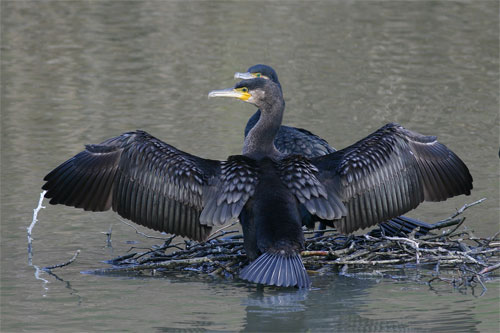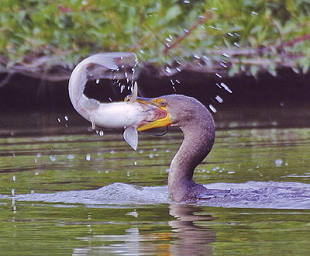Endlich begreift auch die europäische Obrigkeit, dass die massive Überzahl von Kormoranen ein grosses Problem für die Fischwirtschaft ist. Wir bleiben am Ball und berichten weiter, wenn sich in dieser Sache etwas tut.
We have a great problem on the European continent with the Cormorans, but it seems, that now is a hope for a necessary reduction. We will see what happens and will inform you.
Europaparlament drängt EU-Kommission zum Handeln:Grosse Mehrheit für EU-weit koordiniertes Kormoranmanagement
Mit einer überwältigenden Mehrheit von 96 Prozent hat sich das Europäische Parlament für einen "Europäischen Kormoran-Managementplans zur Reduzierung der zunehmenden Schäden durch Kormorane für Fischbestände, Fischerei und Aquakultur" ausgesprochen. Der SPD-Europaabgeordnete und Berichterstatter, Dr. Heinz Kindermann, zeigte sich über das Abstimmungsergebnis sehr erfreut: "Die breite Unterstützung über alle Parteigrenzen hinweg zeigt, dass der Kormoran in vielen Regionen ein echtes Problem darstellt. Durch verstärkte Koordinierung, Kooperation sowie Kommunikation aller betroffenen Gruppen kann die EU einen entscheidenden Beitrag zur Lösung des Problems leisten."
Allein in den letzten zehn Jahren haben sich die Kormoranbestände in Europa mehr als verdoppelt. Ein Kormoran frisst ca. 500 Gramm Fisch pro Tag, das macht bei derzeitig fast zwei Millionen Vögeln insgesamt 1.000 Tonnen Fisch am Tag. Schäden an Fischbeständen und Fischereigewässern sind daher unausweichlich und untragbar für alle in der Fischerei tätigen Gruppen. Dazu zählen die Berufsfischerei, die Aquakultur, die Freizeit-Angelfischerei und Fischerei-Geschäfte, die seit Jahren einen gesamteuropäischen Kormoran-Managementplan fordern.
"Die Vergangenheit hat gezeigt, dass auf Grund der großen Mobilität des Kormorans regionale oder nationale Maßnahmen nicht ausreichen, um die negativen Folgen durch Kormorane für die Tier- und Pflanzenwelt zu reduzieren", erklärte der Berichterstatter. Ein gemeinsamer, rechtlich verbindlicher und am Ökosystem orientierter Ansatz, der europaweit akzeptiert und umgesetzt wird, sei daher unbedingt erforderlich und würde nicht zuletzt allen beteiligten Gruppen mehr Rechtssicherheit garantieren.
"Das Europäische Parlament hat seine Hausaufgaben gemacht, jetzt ist die Europäische Kommission gefordert", so Dr. Kindermann abschliessend.
December 4, 2008:
Victory in Europe. They have been dubbed the 'Luftwaffe' by anglers
- black, winged shapes, flying low, seemingly inexhaustible loose formations over our skies, raiding our fisheries before returning home. For many years a 'Battle of Britain' of words, politics and research has been fought out with legions of cormorants - a protected species - and its allies, a strong lobby of bird-lovers.
The 'war' hasn't just been fought solely in Britain, however. Throughout Europe, fish stocks have been ravaged by the 'black plague' and, now, following protracted lobbying and negotiations and the release of the Kindermann Report, the European Parliament has decided to support a pan-European Cormorant Management Plan. In fact, the motion was so overwhelming that out of 565 MEPs, only seven voted against it.
Such strong backing should act to put heavy pressure on the European Commission and Council of Ministers to put forward a request for a pan-European management plan and basic 'Only seven elements to ensure its effective implementation. Thus acting as a stepping stone to assisting fishery managers that have been virtually powerless to do anything in the past.
Within Heinz Kindermann's report were startling statistics: against it Cormorants take more than 300,000 tonnes of fish from European waters every year. In many Member States this is many times more than the volume of edible fish produced by professional inland fishermen and fish farmers. This figure of 300,000 tonnes is more, for example, than the combined fish production from aquaculture of France, Spain, Italy, Germany, Hungary and the Czech Republic." The Management Plan aims to minimise the increasing impact of cormorants on fish stocks, fishing and aquaculture, whilst at the same time providing the appropriate levels of protection.
President of SANA, Ronnie Picken, welcomed the move against this "ornithological scouige that has inflicted our fisheries". He is delighted by the fact that European parliament has seen sense in what was seen to be a straightforward issue, which, in Scotland, has been clouded by the strong political sway the Royal Society of Protection of Birds (RSPB) holds over Scottish Natural Heritage (SNH). "When the RSPB tells SNH to jump, SNH ask 'how high?'", he told FF&FT. He sees the European decision as one of hope for the environment in the future, offering success and sanity to issues when other efforts on a more localised scale have failed.
The result is a fillip for the European Anglers Alliance, which is a unified body of national governing bodies for angling, similar in structure in England's new body- the Angling Trust. Speaking to FF&FT just days before the Trust became official on January 5, 2009, Mark Lloyd, the Trust's Chief Executive, sees the power of numbers as a key to the decision. "This excellent decision reflects concerted lobbying at a European level by the European Anglers Alliance, which comprises several well organised national governing bodies for angling with mass membership," he said. "The Angling Trust aims to become such a body so that it can lobby effectively for anglers at a national and international level on similar issues. The Trust will in 2009 be pressing for wholehearted implementation of the Cormorant Management Plan in this country so that all coastal, game and coarse fisheries which suffer excessive predation by cormorants can be restored and protected in the future. We look forward to working with our members to identify priority areas for action on this important issue."
The cormorant has brought about different stocking regimes within surviving stocked reservoirs, and has been implicated as a major factor in the reduction of wild stocks of both grayling and trout in some rivers. This move in Europe should now see fishery managers of the future more able to combat the 'black menace' without both hands tied behind their backs.
Mark Bowler Editor Flyfishing Flytying


